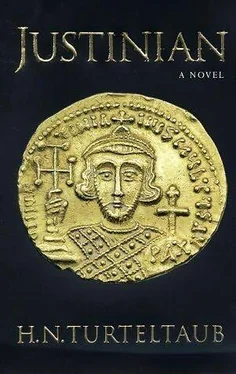Harry Turtledove - Justinian
Здесь есть возможность читать онлайн «Harry Turtledove - Justinian» весь текст электронной книги совершенно бесплатно (целиком полную версию без сокращений). В некоторых случаях можно слушать аудио, скачать через торрент в формате fb2 и присутствует краткое содержание. Жанр: Историческая проза, на английском языке. Описание произведения, (предисловие) а так же отзывы посетителей доступны на портале библиотеки ЛибКат.
- Название:Justinian
- Автор:
- Жанр:
- Год:неизвестен
- ISBN:нет данных
- Рейтинг книги:3 / 5. Голосов: 1
-
Избранное:Добавить в избранное
- Отзывы:
-
Ваша оценка:
- 60
- 1
- 2
- 3
- 4
- 5
Justinian: краткое содержание, описание и аннотация
Предлагаем к чтению аннотацию, описание, краткое содержание или предисловие (зависит от того, что написал сам автор книги «Justinian»). Если вы не нашли необходимую информацию о книге — напишите в комментариях, мы постараемся отыскать её.
Justinian — читать онлайн бесплатно полную книгу (весь текст) целиком
Ниже представлен текст книги, разбитый по страницам. Система сохранения места последней прочитанной страницы, позволяет с удобством читать онлайн бесплатно книгу «Justinian», без необходимости каждый раз заново искать на чём Вы остановились. Поставьте закладку, и сможете в любой момент перейти на страницу, на которой закончили чтение.
Интервал:
Закладка:
Several bishops sighed then: the monothelites who had hoped to see their doctrine proved in one fell swoop. A moment later, other bishops also sighed, these, I thought, with relief: the men who, like my father, supported the doctrine of two wills and two energies.
Thinking of my father, I glanced toward him. He had just finished signing himself with the holy cross, and now stared balefully at Polykhronios. "False priest, you are a fraud, and your dogma an error," he said, as if passing sentence. And so he was- sentence on monotheletism.
Andreas's widow let out a great wail of cheated hope, and would have attacked Polykhronios with clawed fingers had Myakes not seized her shoulders and held her back. As for Polykhronios himself, he answered only, "I am not beaten yet." He tugged at the dead man's shroud so his memorial could rest directly on flesh. Even after that, though, Andreas lay unmoving.
"Live!" Polykhronios said, this time in some annoyance, as if the corpse were a willful child disobeying its father. He muttered into dead Andreas's ears. I could not hear everything he said, but I think it was incantation, not prayer. Whatever it was, it had no effect.
After an hour passed with no resurrection, the assembled bishops grew restive. Arculf began popping handfuls of chickpeas into his mouth once more (in truth, he had not stopped doing that all through Polykhronios's performance, but he had slowed down).
And George the ecumenical patriarch of Constantinople, with wickedly sardonic glee, quoted from First Kings, the passage wherein Elijah mocked the priests of Baal when they proved unable to summon him: "Cry aloud, for he is a god; either he is musing, or he is gone aside, or he is in a journey, or peradventure he sleepeth, and must be awaked.'
Some of the bishops, recognizing the allusion, laughed out loud. Arculf was swallowing as George spoke, and almost choked to death. Hatred flashed in Polykhronios's dark eyes, but it surely was, as the corpse on the silver table attested, hatred of an impotent sort.
Polykhronios kept trying to persuade dead Andreas to live until my father at last lost patience with him. This took longer than I would have expected, but when it happened, it happened all at once. Pointing first to the memorial on Andreas's unmoving chest and then to Polykhronios, he demanded, "Having seen your own failure, do you now admit the error of your dogma?"
To my amazement- to everyone's amazement- Polykhronios shook his head. "No, Emperor, I do not," he declared. "Since the doctrine is perfect and true, the error must lie in me, and I-"
As I said, once my father lost patience, he lost all patience. He allowed the bishop not another word, but shouted, "Let Polykhronios be anathema!"
"Let Polykhronios be anathema!" Baying like wolves, the bishops took up the cry, loudest among them George. Polykhronios's protests were overwhelmed in an avalanche of scorn, and the anathema duly recorded for all time in the acts of the holy ecumenical synod.
On Holy Thursday, as was the custom each year, the three pieces of the holy and life-giving wood of the True Cross were removed from their case and set on a golden altar in the center of the great church. As always when the case is opened, a scent like that of all the flowers in the world came forth, and everyone in the church of the Holy Wisdom sighed with pleasure.
My father advanced to the holy and life-giving wood, bowed his head, and kissed it. After him came my uncles Herakleios and Tiberius, the junior Emperors. Then it was my turn. Though I had performed the ritual every year of my life since I could toddle to the altar, it took on a special meaning with the bishops assembled for the ecumenical synod watching as I brushed the True Cross with my lips. The wood was smooth from countless kisses. At each knot, oil with that special fragrance welled forth. After Easter, that oil would be gathered and used to treat the sick, for whom it was a surer cure than any physician could give.
My brother Herakleios followed me to the True Cross. After him came Christopher the count of the excubitores- the commander of the imperial bodyguard- his mandator or chief deputy Theodore of Koloneia, and the other leading soldiers of the realm. I remember Florus, Petronas, and Kyprianos, still basking in the glory of their victory over the Arabs three years before, and the first appearance in the great church of a new general, a round-faced man named Leontios, who had won distinction in the endless skirmishes in Armenia. The procession of warriors continued until all the excubitores had kissed the life-giving wood.
On Good Friday my mother, the Empress Anastasia, led a similar procession of the women of the court. And on the Saturday of the Passover Sabbath, the bishops who had come to the imperial city for the sixth holy and ecumenical synod joined patriarch George of Constantinople and the other clerics who served the great church in adoring the life-giving wood. When the lips of Arculf of Rhemoulakion touched it, I wondered if he would leave on it oil different from that which it secreted of its own accord, as he had been eating olives again while the procession of bishops formed. But the man behind him made no complaint, so perhaps he had managed to wipe his mouth on his sleeve.
By Easter, which fell in that year on the fourteenth day of April, the ecumenical synod had nearly finished its work. Had that not been so, the assembled bishops would have faced my father's displeasure, for he, who had waited in Constantinople while the holy season- and three precious weeks of spring- passed, was eager to depart and assail the Bulgars. This he did, less than a week after the day of our Lord's resurrection from the dead, satisfied the synod had defined the faith as he desired.
He left me to preside while the bishops discussed other matters of canon law unrelated to the doctrine of Christ's two wills and two energies. On some of these, they in the end reached no firm conclusion, a failure like that of the holy fathers who took part in the fifth holy ecumenical synod, the one convened by the Emperor for whom I am named, the first Justinian, almost a century and a half earlier. Before my treacherous overthrow, I made good the deficiencies of those two synods, summoning my own to deal with matters they had neglected.
The other remaining subject of debate was that of anathemas. Polykhronios had richly earned his: there everyone agreed. Past that, consensus faltered. Four patriarchs of Constantinople ended up condemned: Sergios, who first proposed monenergism to the Emperor Herakleios, and his successors, Pyrrhos, Paul, and Peter, who upheld monenergism and monotheletism.
Some of the bishops more aggressive in their piety, and some of those from the western lands, also suggested anathematizing Herakleios and Constans. When one of their number proposed casting my great-great-grandfather and my grandfather into the outer darkness of anathema, applause rang out in the great church.
"No!" I shouted. "I forbid it!"
They stared at me. I had not quite twelve years then, and my voice had not broken. But I was older than Constans had been when he became Emperor of the Romans, and only a bit more than five years younger than my father when he gained the rule- and he had also been administering affairs in Constantinople for some time before that. I had no excubitores at my back; they had accompanied the Emperor in his campaign against the Bulgars. I knew what he would say, I knew what he was liable to do, if he returned to the imperial city to find his ancestors condemned to anathema.
The bishop who had made the proposal said, "Prince, they deserve the sentence no less than their misguided patriarchs. After all, it was your grandfather who made the holy Pope Martin and Maximus the Confessor suffer on behalf of the doctrine we ourselves have declared true and correct, and so-"
Читать дальшеИнтервал:
Закладка:
Похожие книги на «Justinian»
Представляем Вашему вниманию похожие книги на «Justinian» списком для выбора. Мы отобрали схожую по названию и смыслу литературу в надежде предоставить читателям больше вариантов отыскать новые, интересные, ещё непрочитанные произведения.
Обсуждение, отзывы о книге «Justinian» и просто собственные мнения читателей. Оставьте ваши комментарии, напишите, что Вы думаете о произведении, его смысле или главных героях. Укажите что конкретно понравилось, а что нет, и почему Вы так считаете.












